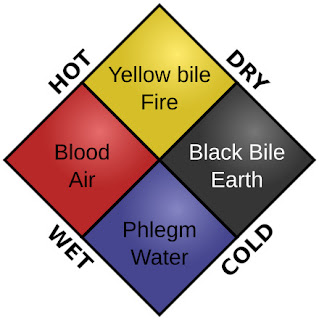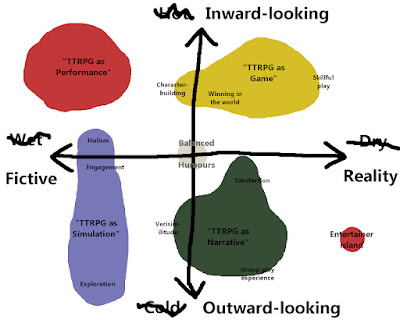The Angry GM recently published an article about the distinct ways in which players play RPGs, with the specific example of D&D.
He mentioned in particular the rise, or increase, of an attitude towards the game as an intrinsically theatrical activity, adding that to the old GNS classification:
Some players see D&D as a Game. They think it’s about overcoming obstacles, winning adventures, accomplishing goals, and advancing characters.
Some players see D&D as a Narrative. They think it’s about telling a story of fantasy adventure and they want to share the most interesting story possible.
Some players see D&D as a Simulation. They think it’s about entering a world as a character and dealing with it as it is. Whatever happens happens.
And now, some players see D&D as a Performance. They think it’s about putting on a show. They have a role to play and they’ve got to play it to the hilt. In the most interesting and engaging way possible.
It's a good article, worth checking out. While reading, it occurred to me that we could treat GNS Theory as just a way to describe some of the emergent properties of a simple pair of dichotomies, along the lines of another well-respected and evidence-based organisational schema, that of the humoral theory of human health.
Take all of this very seriously please.
A simple pair of dichotomies
Somebody is playing a tabletop role-playing game. They are engaging with an activity, making decisions, thinking about what they are doing. The act of play is, ultimately, a realisation of the act of thought. What is the player spending most of their brainpower thinking about?There are two dichotomies here.
- Is the player thinking mostly about their real world environment (the people they are playing with, the game rules, the miniatures, the side conversations)? Or are they thinking mostly about the fictive setting? Or something in between?
- Is the player thinking mostly in an inward-looking away, about themself and what is theirs or squarely within their purview? Or are they thinking mostly in an outward-looking way, about things around them and outside of their control? Or something in between?
We can put this on a pair of axes, as in this professionally-drawn image.
And now a picture emerges, of what GNS+P is describing, but defined in terms of these innate characteristics of human thought:
These of course are what modern
GNS+P Theory doesn't map precisely to the four resulting quadrants, of course. There's some interplay and outliers. We have debatable blobs, not square pigeonholes.
Let's break this exciting new bit of science down.
Yellow bile 'TTRPG as Game'
Temperament: choleric (ambitious, driven, aggressive)What is a Gamist player thinking about?
Their thoughts tend to be INWARD-LOOKING: upon their own (and usually necessarily, the group's) ability to win; to this end they channel attention into their own player skill, their own knowledge of the rules, and making decisions about their own character's capabilities.
Their thoughts typically tend towards REALITY: the nature of the game and how to win it, the rules and mechanics, win and lose conditions, and how to get other players to go along with their plans. But they do still focus some of their attention on parts of the fictive environment: the obstacles to winning that their character encounters, and the mechanical ways they can get advantages with their character (in particular, advancement). The yellow blob in the diagram therefore stretches away towards the left.
To put it another way, Gamists have an excess of yellow bile.
Black bile 'TTRPG as Narrative'
Temperament: melancholic (sad, delusional, deep in fantasy)What is a Narrativist player thinking about?
Their thoughts tend to be OUTWARD-LOOKING: towards the group having a satisfying play experience and how the game's play will become a story after the fact. At times, they may care more about their own enjoyment of the game-as-story, thus leaning towards the inwards-looking position.
Their thoughts tend towards REALITY: making decisions for the good of the players' play experience, the emergent story, and what will be 'interesting'. If they care about the game rules, it is in case those become an impediment to higher-order goals. (The Narrativist's thoughts may also drive towards a story with verisimilitude and/or immersion, creeping towards engagement with the fictive environment.)
To put it terms we can all understand, Narrativists may have an excess of black bile.
Phlegm 'TTRPG as Simulation'
Temperament: phlegmatic (calm, reserved, analytical)What is a Simulationist player thinking about?
Their thoughts tend to be OUTWARD-LOOKING: at the world around their character, and at things they don't already know. They want to discover things about the fictive world and see how they mesh together, and inwards things like their knowledge of the rules and their character are mostly ancillary to that. But the act of engagement still requires making plausible decisions about the character, and the Simulationist does typically spend some attention on their character's place within the world (thus, the blue blob on the chart reaches upward).
The Simulationist's thoughts are almost strictly FICTIVE: They care most about the world they are playing in. The game's rules are meant to simulate a world, the GM is the arbiter of those rules, and the outcome of those rules is to be accepted and examined, never challenged or overruled for the sake of higher-order player/GM goals.
So of course, Simulationists have an excess of phlegm.
Blood 'TTRPG as Performance'
Temperament: sanguine (passionate, mirthful, self-indulgent)The Angry GM suggested 'Performance' as a new and increasingly popular playstyle category, characterised by (amongst other things) creating
characters with clearly defined motivations, personalities, beliefs, goals, and fears right from the get-go. Their character’s character doesn’t emerge from gameplay and it doesn’t change as the game plays out.
What is a Performer player thinking about?
Their thoughts are ultimately INWARD-LOOKING: Most of all, they care about their own character, deciding its intrinsic properties, and then getting across those preselected properties.
Their thoughts are largely on the FICTIVE: How to affect the fictive world by determining a tiny part of it; looking for opportunities in the world to accomplish their secondary goal of expression. External things like 'the game rules' and 'the other players' don't impact this very much for trad RPGs.
Or as we normal, modern people would definitely say in normal, modern terms, "Performers have an excess of blood".
I put something weird on that chart, though.
Entertainer island
I think there's a little outcrop of the Performative playstyle occupying the diametrically opposite position.A player can start with a solid foundation of
But with those humors as a firm foundation, most of the player's attention is freed up to focus on the actual performative act, which is ultimately outward-looking in reality (given that it is a process of interaction with an audience). With this inversion of the expression of their
Balancing the humors
So it seems likely that people can have a predisposition towards certain humors, and we might or might not regard this as an imbalance of humors.What are the implications? Let's sketch just a few, presupposing (naturally) that two thousand years of high-quality humoral medicine can be extended to the modern environment of the game table.
- A player who is desirous of a more neutral or 'balanced' playstyle may examine the degrees to which they are inward- or outward-looking, in the fictive world or reality, and deliberately change their behaviours accordingly.
- If the players and the GM at a table all have a similar humoral temperament, then we would expect their games to run well if they indulge in that temperament, although players of a different style would scarcely recognise the game they were playing!
- In rare circumstances where the group dynamics are just right, players of completely opposite humoral temperaments may 'cancel out' at the table due to the ways they use and express those temperaments, resulting in (against the odds) a harmonious, near-maximally-enjoyable game.
- Obviously, players may be able to select the right foods and drinks to modulate any excess of humors. By careful review of TTRPG play I have discerned some of the modern-day nostrums: pizza (hot + dry); coffee (hot + wet); soda (cold + wet); chips (cold + dry).
Science marches ever onwards.










No comments:
Post a Comment